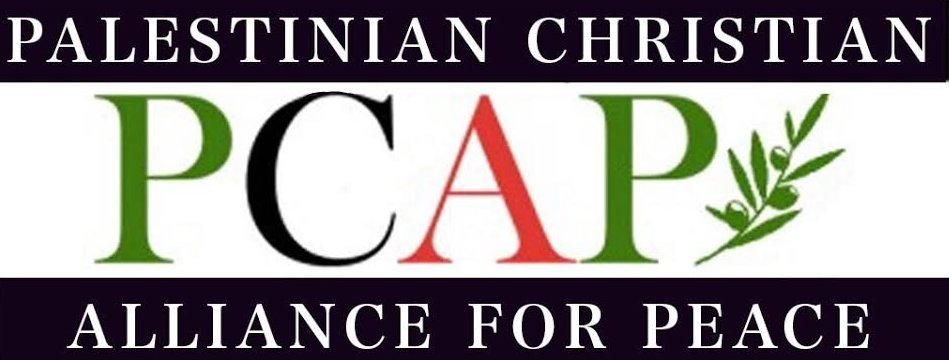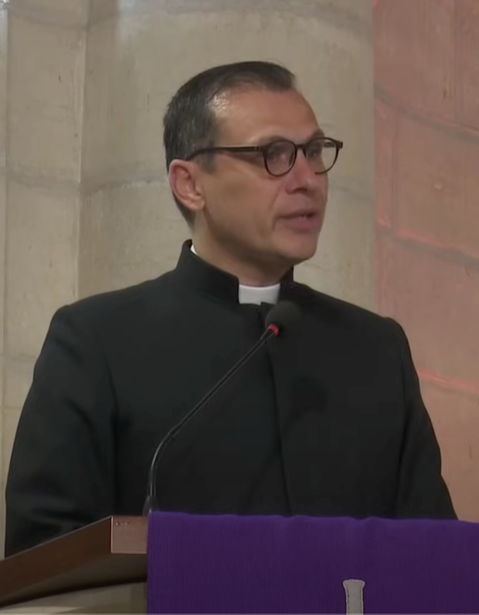Take a Stand Campaign
What are Holy Land Christians saying?
Fr. Gabriel Romanelli, priest of Holy Family Catholic Church in Gaza: “The international community’s silence is as deadly as the weapons used in Gaza.” July 3, 2025 (On July 14, Father Romanelli’s church was shelled by Israel, wounding him and killing three.)
For decades, Christians of the Holy Land, missionaries and others have tried to inform American Christians about the situation for the region’s indigenous people. Yet they have often been met with indifference or disbelief. Many church members are content to go on trips that emphasize the historical sites of the Bible, rarely if ever meeting the “living stones” of their faith who live there. Others, equating the Israel of the Bible with the modern nation created in 1948, refuse to hear anything that casts doubt on present-day Israel’s actions. Meanwhile, the silence of the people in the pews has been a source of dismay as the situation for members of their own faith community in the Holy Land has worsened. In 2024, Rev. Munther Isaac, pastor of the Christmas Lutheran Church in Bethlehem, said, "If you are not appalled by what is happening, if you are not shaken to your core, there is something wrong with your humanity.”
The silence of global Christians has emboldened the Israeli government in its relentless attacks on Gaza and assaults in the West Bank, as well as the violent Israeli settlers who are attacking Christian as well as Muslim towns. As this Study Guide is being written, Taybeh - the only remaining all-Christian town in the West Bank - is under attack by Israeli settlers who have set fires, burned cars, evicted families from their homes, and destroyed the village’s agricultural fields.
Taybeh: Flames surround the historic Church of Saint George, as the residents of Taybeh resist settler attacks to protect their history and holy sites. Photo Credit: Nabd El Haya
In response, the heads of churches in Jerusalem issued a statement saying, “The Church has had a faithful presence in this region for nearly 2,000 years. We firmly reject this message of exclusion and reaffirm our commitment to a Holy Land that is a mosaic of different faiths, living peacefully together in dignity and safety. The Council of Patriarchs and Heads of Churches calls for these radicals to be held accountable by the Israeli authorities, who facilitate and enable their presence around Taybeh… We call for an immediate and transparent investigation into why the Israeli police did not respond to emergency calls from the local community and why these abhorrent actions continue to go unpunished. The attacks by the hands of settlers against our community, which is living in peace, must stop, both here in Taybeh and elsewhere throughout the West Bank. This is clearly part of the systematic attacks against Christians that we see unfolding throughout the region.”
Patriarchs and heads of churches in Jerusalem also condemned Israel’s July 17, 2025 shelling of the Holy Family Catholic Church in the Gaza Strip that killed three people and wounded ten as a “criminal act.” They urged the international community to act to halt the war and expressed “deep solidarity” with the Latin Patriarchate of Jerusalem and all those who had taken shelter at the church, calling Israel’s attack a “horrific assault.” They said targeting a church sheltering 600 refugees, including children with disabilities, was a “flagrant violation” of the law and an “affront to human dignity and sanctity of life,” they said.
Earlier Pleas
In 2009, Christians of the Holy Land issued a powerful call to churches of the world known as Kairos Palestine. This was a historic call signed by thousands of Palestinian Christians. It cried out for an end to complacency. It asked for concrete actions to help end the occupation and discrimination that confront Palestinians daily. (The Kairos document followed other efforts to reach global Christians, including the Amman Call of 2007 and the Berne Perspective in 2008, both issued through the World Council of Churches.)
Below is an excerpt from the Kairos call to churches of the world from Holy Land Christians:
“We declare that the military occupation of Palestinian land constitutes a sin against God and humanity. Any theology that legitimizes the occupation and justifies crimes perpetrated against the Palestinian people lies far from Christian teachings.
We urge the international community to stand with the Palestinian people in their struggle against oppression, displacement, and apartheid.
We demand that all people, political leaders and decision-makers put pressure on Israel and take legal measures in order to oblige its government to end its oppression and disregard for international law.
We hold a clear position that non-violent resistance to this injustice is a right and duty for all Palestinians, including Christians.
We support Palestinian civil society organizations, international NGOs and religious institutions that call on individuals, companies and states to engage in boycotts, divestment and sanctions against the Israeli occupation.”*
(*This call to use the tools that brought apartheid to an end in South Africa actually came from Christians in the Holy Land themselves. It has been portrayed as radical and dangerous, when it has been embraced by Christians seeking to end injustice for centuries. The Boston Tea Party was one of the first boycotts, and helped Americans gain their freedom.)
“We declare that the military occupation of Palestinian land constitutes a sin against God and humanity. Any theology that legitimizes the occupation and justifies crimes perpetrated against the Palestinian people lies far from Christian teachings.”
On May 14, 2021, the Christian leaders of the Holy Land issued another urgent call to the Vatican, The World Council of Churches and Church Leaders Worldwide for Solidarity and Action. Highlights of that statement are below:
“The Christian Palestinian Initiative, Kairos Palestine, urges the Christian community worldwide to act justly and speak the truth about Israel’s oppressive policies and practices, especially regarding violent attacks on Palestinians in Jerusalem and Israel’s deadly assault on the people of Gaza….
We insist that the latest violence be seen in its broader context. Israel’s decades-long, brutal occupation of Palestinians has been shaped by a growing system of punitive racist policies, laws and practices. We don’t ask you to take our word for this. Civil society groups such as Human Rights Watch and the highly respected Israeli human rights organization B’tselem have recently declared that Israel is an apartheid state….
Kairos Palestine repeats, still again, our 2009 word to the international community: “…stop the principle of ‘double standards’ and insist on the international resolutions regarding the Palestinian problem with regard to all parties.” As long as the international community does not have the political will to take concrete actions against Israel, it will continue to breach international human rights and humanitarian law with impunity.
We therefore call on the global Church and the international community to call things by their names, to speak truth to power, and to side with the oppressed…. We do not need calls for calm and toothless church statements that “call for peace.”
In August 2024, the patriarchs and heads of churches in Jerusalem issued yet another call for action and appealed for a negotiated peace agreement, saying “we stand at the precipice of a full-blown regional war.” The statement called attention to the dire situation for Gazans, expressing particular concern for the Christians sheltering in Gaza’s churches as well as the staff and patients at al-Ahli Anglican Hospital. It called for “adoption of an internationally legitimate two-state solution.”
As the number of Palestinians killed in Gaza exceeds 60,000*, including over 17,000 children, and the number of injured exceeds 143,000, many Christians in the Holy Land are urging Christians everywhere to recognize this as a genocide. In a momentous sermon at Riverside Church in New York in August, 2024, Rev. Munther Isaac said, “If we, as Christians, are not outraged by this genocide, by the weaponizing of the Bible to justify it, there is something wrong with our Christian witness, and we are compromising the credibility of our Gospel message.”
“If we, as Christians, are not outraged by this genocide, by the weaponizing of the Bible to justify it, there is something wrong with our Christian witness, and we are compromising the credibility of our Gospel message.”
These words resonate as the United Nations reports that hunger in the Gaza Strip has reached catastrophic levels, with people collapsing in the street and hundreds of starving people shot at food distribution sites. Our faith community in the Holy Land is giving us a chance to practice our faith, to show the world what it means to follow Christ, stand with the oppressed, lift the injured and abandoned…including our own faith family … out of the ditch of despair. We can no longer be content with Bible stories that celebrate ancient choices, ancient deeds. Our choice today should be clear. This is the Gospel message, and we should never be afraid to answer this call.
Above left: Rev. Munther Isaac preaching at the Christmas Lutheran Church he pastors in Bethlehem. His sermon, “Christ in the Rubble,” was carried around the world, capturing the deep sense of abandonment felt by Christians of the Holy Land. At right: The original Kairos Palestine Document, with study guide for churches.
Notes: The historic sermon by Rev. Isaac at Riverside Church and his Christ in the Rubble sermon from Bethlehem are available on YouTube and should be heard by every Christian.
*A study published in The Economist in May 2025 suggested the actual death toll may be 46-107% higher.




